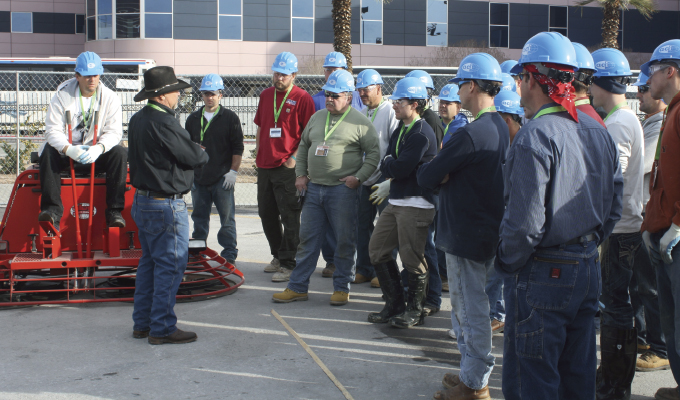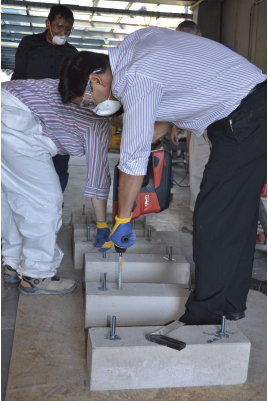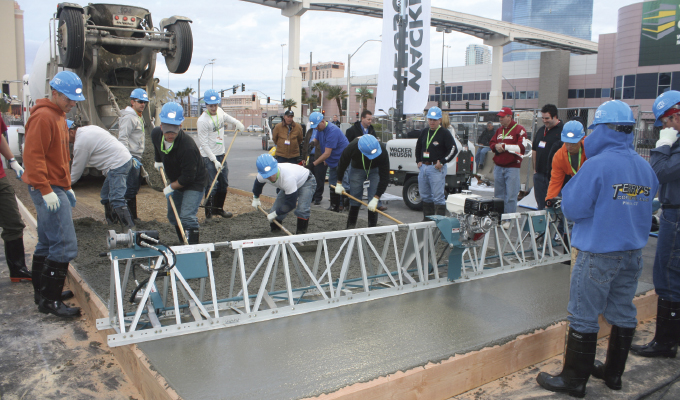More than ever, concrete employers are looking for certified concrete professionals. With certification programs from the American Concrete Institute (ACI), contractors, craftsmen, technicians, inspectors, and designers can prove their knowledge and demonstrate their skill with concrete. But beyond the individual benefits, ACI certification plays a crucial role in elevating the industry as a whole.
WHY GET CERTIFIED?
ACI saw a 12-percent increase in certification exams last year, reaching a record high of 44,500 tests administered, according to John Nehasil, senior managing director of ACI Certification and Chapters. This trend underscores a widespread recognition within the industry: Certifications are not merely optional credentials but often mandatory requirements.
“Aside from simply being a good idea to employ qualified workers, in many instances it’s required,” says Nehasil. Whether cited by codes and guide specifications or included in job specifications, he says certification is “just flat-out required.” Further, Nehasil stressed, “Certification is a team effort, engaging approximately 1,500 industry professionals working through 138 ACI chapter and non-chapter sponsoring groups operating in 27 countries to meet the growing need for these programs.”
Certification indicates concrete professionals can execute projects safely, efficiently, and to a high degree of quality, fostering trust with clients and stakeholders. Increasingly, owners and employers want proof that the people they are hiring to build their buildings, bridges, or pavements have the proper credentials.

FINDING THE RIGHT PROGRAM
ACI offers more than 30 certification programs. Programs fall into four primary categories— materials testing, construction inspection, construction/specialist, and design professional programs—and each area of expertise is categorized further from there. These range from decorative concrete flatwork finisher and adhesive anchor installer to nondestructive testing specialist and laboratory testing, catering to a wide array of specialties within the concrete industry.
Contractors are especially urged to consider the concrete flatwork, decorative flatwork, and specialty commercial/industrial concrete flatwork finishing programs, the shotcrete nozzle operator and inspection programs, the tilt-up supervisor program, residential concrete foundations technician program, and the adhesive anchor installer program. Details for all ACI Certification programs can be found at www.acicertification.org.

LOCATING A TRAINING SITE
ACI certifications are obtained through a robust network comprising more than 135 ACI chapters and non-chapter sponsoring groups, all adhering to ACI’s stringent oversight requirements. This ensures a standardized and accountable certification process across various locations. Improving on the independent examiners model in the 1980s, the sponsoring group administrative model ensures that examinees receive a fair and equitable knowledge and skills assessment and, if certified, are able to perform at the level targeted by the certification.
PREPARATION AND ASSESSMENT
When it comes to preparing and taking the exams, prospective candidates are urged to thoroughly prepare using the provided workbooks and study materials. It is important to be familiar with the content and procedures of the chosen certification before taking the exams. Assessment exams may include both written and performance components. Where programs require correct performance of procedures/demonstration of proper skills, certification candidates should seek hands-on instruction from qualified personnel.
If there are any questions, candidates may contact ACI World Headquarters, an ACI Resource Center, or the Sponsoring Group they have selected to register with.
Visit www.concrete.org or www.aciresourcecenters.org to learn more. Candidates may also send questions directly to aci.certification@concrete.org.
FUTURE OF ACI CERTIFICATION
ACI is constantly adding new certifications to meet the needs of concrete professionals worldwide. One of the certifications under development is a slip-form paver certification for airfields, tarmac, runways, and highways. ACI also is working on a sustainability and resilience assessor program, which will focus on credentialing professionals who can assist in executing construction projects more sustainably from the design phase through the construction phase.
ACI Certification is more than a credential; it is a gateway to new opportunities, higher standards of project execution, and a testament to an individual’s commitment to excellence in the concrete industry.
If you are ready to elevate your career with ACI certification, visit ACI Certification for more information and start your certification journey today.
Emily Emanuelsen is the publications coordinator for Advancing Organizational Excellence (AOE) and serves as the managing editor for the PTI Journal. She has a BA in English and Economics and an MFA in Writing.


